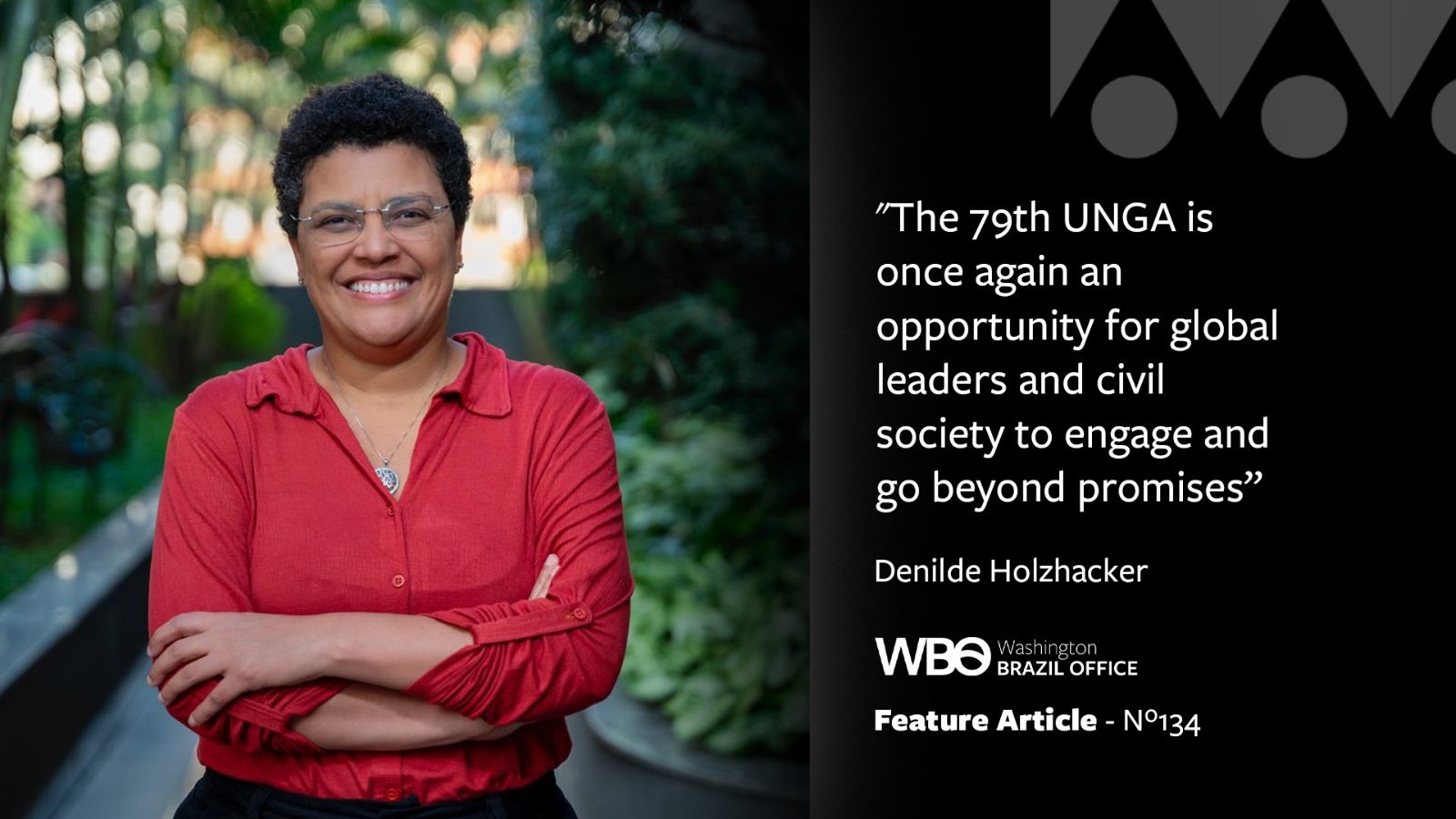79th UN General Assembly: A New Opportunity for Progress on the Global Agenda
Denilde Holzhacker has a doctorate in Political Science and is professor of International Relations and currently director of Research and Stricto Sensu Postgraduate Studies at Escola Superior de Propaganda e Marketing. This article was written for issue 135 of the WBO weekly bulletin, published on September 13, 2024. To subscribe to the bulletin and receive it for free, enter your email in the field below.
The 79th United Nations General Assembly (UNGA) will be held from September 10 to 30. It is one of the most important events on the global diplomatic calendar. It brings together leaders and diplomatic delegations from 193 countries in what can be compared, in an analogy with the world of sports, to the Olympics or the Soccer World Cup, given the nature of the event as a major international stage since its first session on January 10, 1946 in London.
Created by the 1945 United Nations Charter, the United Nations General Assembly has played a fundamental role in the international arena. The period after World War II (1939-1945) highlighted the need to create an organization capable of mediating conflicts, promoting human rights, and building mechanisms for resolving disputes between States. As the decades pass, global challenges become even more complex. And, in a year marked by multiple crises – such as climate change, armed conflicts, the decline of democratic institutions, and humanitarian and migration crises – expectations are renewed that the UNGA can go beyond traditional speeches and debates, increasing pressure for a renewal that can unlock the inaction that has marked the multilateral agenda in recent years.
According to the UN Charter, the General Assembly exercises deliberative, supervisory and financial functions over the bodies of the United Nations. This body is also a space to discuss issues and make recommendations to its members. Although it does not have the power to impose resolutions or actions, the deliberative character and the space for discussion are renewed at each annual meeting of the General Assembly and in its special sessions. This year, the theme chosen by UNGA’s elected President, Philemon Yang of Cameroon, was “Leaving No One Behind: Acting Together to Advance Peace, Sustainable Development, and Human Dignity for Present and Future Generations.”
At the beginning of each regular session, the General Assembly also holds a general debate, in which all country leaders give speeches and present issues of international interest. Traditionally, Brazil opens the speeches of country leaders and representatives each year. Since democratization, all presidents have taken the floor of the Assembly to present their main views on Brazilian foreign policy. However, the floor is not always used to address the international agenda; sometimes, the speech is directed at national public opinion. This strategy is also used by other leaders who focus on their domestic platforms rather than the global agenda.
However, the organization of the sessions of the 79th UNGA is not limited to the statements of the heads of state, with most of the work of the annual meeting being delegated to six committees: (1) Disarmament and International Security, (2) Economic and Financial, (3) Social, Humanitarian, and Cultural, (4) Special Policy and Decolonization, (5) Administrative and Budgetary and (6) Legal. In these committees, the diplomatic community proposes recommendations and actions that will be incorporated into the different multilateral forums.
Lula speaks at the opening of the 78th UN General Assembly in New York. Photo: Ricardo Stuckert/PR
In parallel with the ordinary meetings, special sessions are organized, which this year will be the following: Summit of the Future, between September 22 and September 23, 2024; High-level plenary meeting on how to deal with the existential threats posed by rising sea levels on September 25, 2024; High-level plenary meeting to commemorate and promote the International Day for the Total Elimination of Nuclear Weapons on September 26, 2024; and High-level meeting on antimicrobial resistance on September 26, 2024.
The Future Summit is an initiative that aims to build a new framework for international cooperation regarding the Sustainable Development Goals (SDGs). After years of uneven progress in achieving the SDGs, the conference aims to revitalize commitments and offer new solutions to systemic problems that still persist on the global stage. During the Summit, the Compact for the Future is being negotiated, which consists of 58 actions aimed at ensuring sustainability and development for all future generations. Also, within the scope of the Summit, the Declaration on Future Generations and a declaration on digital technologies at the global level will be signed.
In the face of global threats and the outbreak of conflicts, the nuclear issue is strongly entering the debates of this year's UNGA. Since the Nuclear Non-Proliferation Treaty (NPT) was adopted in 1968, the international community has acted to limit the spread of nuclear weapons. However, despite some progress, there is still a large nuclear arsenal. And, with conflicts once again dominating the geopolitical agenda, fears are also growing that a new wave of arms races will increase the risks of global instability. Therefore, a new approach to disarmament is essential and relevant to promoting diplomatic solutions in this area.
The fact that nuclear proliferation remains an unresolved issue on the global agenda, like so many other challenges that persist in this area, further increases the need for the United Nations to gain prominence and space to build dialogues with seriousness and urgency. Despite the difficulties inherent in building consensus on the international agenda, the UN remains the most democratic and truly representative space for diverse global perspectives. However, its legitimacy still depends on its ability to transform discussions and speeches that are signed into commitments to implement actions, and not just being limited to intentions. The 79th UNGA is once again an opportunity for global leaders and civil society to engage and go beyond promises. As expressed in the title of the 79th UNGA: let us leave no one behind.


